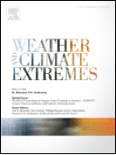
Weather and Climate Extremes
Scope & Guideline
Advancing the Science of Extreme Weather and Climate
Introduction
Aims and Scopes
- Extreme Weather Events:
Research on phenomena such as hurricanes, heatwaves, floods, and droughts, focusing on their occurrence, characteristics, and impacts on ecosystems and human societies. - Climate Change Impacts:
Exploration of how climate change influences the frequency, intensity, and distribution of extreme weather events, including studies on anthropogenic effects and projections for future scenarios. - Compound Events:
Analysis of simultaneous or sequential extreme events (e.g., heatwaves and droughts) and their cumulative impacts, highlighting the interconnected nature of climate extremes. - Methodological Innovations:
Development and application of novel methodologies, such as machine learning and probabilistic modeling, for predicting and assessing extreme weather and climate events. - Regional Focus:
Investigation of extreme weather phenomena across various geographical regions, providing localized insights into climate extremes and their socio-economic implications.
Trending and Emerging
- Compound Climate Events:
There is a growing focus on studying compound climate events—such as simultaneous droughts and heatwaves—highlighting their severe impacts and the need for integrated assessment methodologies. - Attribution Studies:
Increasingly, papers are examining the attribution of extreme weather events to climate change, using advanced statistical and modeling techniques to understand human influence on these phenomena. - Machine Learning Applications:
The use of machine learning for predicting and analyzing extreme weather events is on the rise, showcasing the journal's embrace of innovative technologies to enhance predictive capabilities. - Socio-Economic Impacts:
Research exploring the socio-economic impacts of extreme weather events is gaining traction, emphasizing the importance of understanding how climate extremes affect communities and economies. - Regional Climate Variability:
Emerging studies are emphasizing regional variations in climate extremes, focusing on localized impacts and responses, which is crucial for effective policy-making and disaster preparedness.
Declining or Waning
- Historical Climate Events Analysis:
Research on historical extreme weather events has become less prominent as the journal pivots towards more predictive and modeling-based studies that address current and future climate extremes. - Generalized Climate Modeling:
Broad, less specific climate modeling studies are declining in favor of targeted investigations into compound events and localized impacts, reflecting a trend towards precision in climate science. - Static Risk Assessments:
Traditional risk assessments that do not incorporate dynamic climate modeling or adaptive strategies are becoming less common, as the field increasingly emphasizes the need for proactive and flexible approaches.
Similar Journals
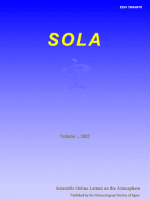
SOLA
Elevating knowledge in the field of atmospheric science.SOLA is a distinguished journal published by the Meteorological Society of Japan, focusing on cutting-edge research in the field of atmospheric science. Since transitioning to an Open Access model in 2018, SOLA aims to facilitate the dissemination of knowledge and foster collaboration among researchers from around the globe. With a proud history spanning from 2005 to 2024, the journal has earned a reputation for high-quality publications, achieving a Q1 ranking in Atmospheric Science according to the 2023 category quartiles. Although its H-Index is currently not available, SOLA is recognized in Scopus rankings, standing at #82 out of 148 in Earth and Planetary Sciences, demonstrating its impact in the field. With its headquarters in Tokyo, Japan, and an unwavering commitment to advancing scientific understanding, SOLA serves as an essential resource for researchers, professionals, and students dedicated to exploring the complexities of atmospheric phenomena.

JOURNAL OF GEOPHYSICAL RESEARCH-ATMOSPHERES
Championing quality research in Earth and planetary sciences.JOURNAL OF GEOPHYSICAL RESEARCH-ATMOSPHERES, published by the American Geophysical Union, is a leading peer-reviewed journal dedicated to advancing our understanding of atmospheric science and related disciplines. With an impressive impact factor and consistently holding a Q1 ranking across key categories including Atmospheric Science and Geophysics, this esteemed journal caters to a global audience of researchers, professionals, and students eager to explore groundbreaking studies and insights. The journal covers a comprehensive scope of topics, from climate dynamics to atmospheric processes, enhancing knowledge and informing practices within the realm of Earth and Planetary Sciences. With its strong emphasis on quality research, it remains a vital resource for those engaged in unraveling the complexities of our planet’s atmosphere. Explore this journal to stay abreast of significant developments and foster a deeper understanding in this ever-evolving field.
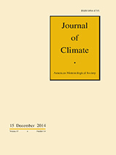
JOURNAL OF CLIMATE
Unraveling Climate Complexity, One Study at a TimeThe JOURNAL OF CLIMATE, published by the American Meteorological Society, stands as a premier source of cutting-edge research in the field of atmospheric science. With an impressive impact factor reflecting its rigorous peer-review process, this journal ranks in the top 20 of its category according to Scopus, with a remarkable percentile of 88th. Since its inception in 1988, the JOURNAL OF CLIMATE has been a vital platform for disseminating high-quality studies that deepen our understanding of climate systems and their global implications. It serves a diverse audience of researchers, professionals, and students interested in climate variability, climate change, and the dynamics of atmospheric processes. Though not an open-access journal, it offers wide accessibility through numerous academic repositories. As it continues to publish essential findings up to 2024, this journal plays a crucial role in advancing knowledge and fostering dialogue within the atmospheric science community.

Journal of Tropical Meteorology
Fostering Collaboration in Tropical Atmospheric StudiesJournal of Tropical Meteorology, published by JOURNAL OF TROPICAL METEOROLOGICAL PRESS, is a leading scholarly journal dedicated to advancing the understanding of atmospheric phenomena and meteorological patterns in tropical regions. With an ISSN of 1006-8775, this journal plays a vital role in disseminating high-quality research, focusing on critical issues such as climate variability, weather forecasting, and tropical cyclone dynamics. The journal, which is indexed in Scopus with a respectable rank in the low quartile of Q3 in Atmospheric Science, aims to provide a platform for researchers and professionals to share groundbreaking insights and foster collaboration within the scientific community. Although it follows a traditional access model, the Journal of Tropical Meteorology encourages submissions from a diverse range of disciplines, thus enriching the field with a variety of perspectives. By bridging theory and practical applications, this journal serves as an essential resource for students, researchers, and practitioners striving to expand their knowledge and contribute to the global conversation on meteorology.
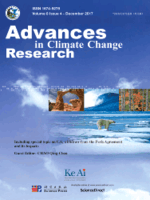
Advances in Climate Change Research
Connecting Researchers to Tackle Climate ChallengesAdvances in Climate Change Research is a premier open-access journal dedicated to advancing the understanding of climate change and its wide-ranging impacts on our planet. Published by KEAI PUBLISHING LTD since 2010, it has established itself as a leading forum for research in Atmospheric Science, Global and Planetary Change, and Environmental Management, achieving a notable Q1 ranking across these categories as of 2023. The journal, which operates out of Beijing, China, ensures that researchers, professionals, and students have unrestricted access to cutting-edge studies, enhancing global knowledge on climate change mitigation and policy development. With impressive Scopus rankings, including 11th out of 148 in Atmospheric Science, it represents a vital resource for those seeking to contribute to climate science and its applications. By submitting your work to this influential journal, you join a global community committed to addressing one of the most pressing challenges of our time.
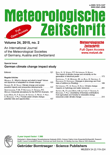
METEOROLOGISCHE ZEITSCHRIFT
Unlocking the Secrets of the AtmosphereMETEOROLOGISCHE ZEITSCHRIFT is a distinguished academic journal dedicated to the field of meteorology and atmospheric sciences, published by E SCHWEIZERBARTSCHE VERLAGSBUCHHANDLUNG. With an ISSN of 0941-2948 and an E-ISSN of 1610-1227, this journal has been an invaluable resource for researchers, professionals, and students since its inception. It has embraced an Open Access model since 2014, promoting wider dissemination of research findings. Based in Stuttgart, Germany, the journal is recognized for its rigorous peer-review process and is currently positioned in the Q3 quartile for Atmospheric Science as per the 2023 category rankings. Additionally, it ranks #97 out of 148 in the Scopus database, placing it in the 34th percentile among Earth and Planetary Sciences. Covering a broad spectrum of topics relevant to meteorology, METEOROLOGISCHE ZEITSCHRIFT serves as a platform for innovative research and theoretical contributions, aiming to advance understanding of atmospheric phenomena and their implications for climate and weather. Researchers and practitioners alike will find valuable insights within its pages, making it a significant asset in the landscape of meteorological scholarship.
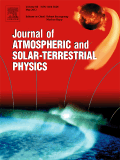
JOURNAL OF ATMOSPHERIC AND SOLAR-TERRESTRIAL PHYSICS
Charting New Frontiers in Geophysics and Space ResearchJournal of Atmospheric and Solar-Terrestrial Physics, published by Pergamon-Elsevier Science Ltd, stands as a pivotal academic resource in the realms of Atmospheric Science, Geophysics, and Space and Planetary Science. With an ISSN of 1364-6826 and an E-ISSN of 1879-1824, this journal encompasses a robust collection of research findings and reviews that address the intricacies of atmospheric processes and solar-terrestrial interactions. The journal has shown consistent academic performance, earning commendable rankings in 2023, including Q3 in Atmospheric Science and Q2 in Geophysics, reflecting its importance for scholarly communication and advancement in these fields. Spanning an impressive convergence of research from 1997 to 2024, it aims to foster interdisciplinary collaboration and inspire innovations among researchers, professionals, and students. Although it currently does not offer open access, the journal is committed to disseminating high-quality content that continues to drive forward our understanding of complex environmental phenomena.
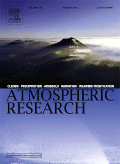
Atmospheric Research
Fostering Innovation in Meteorological StudiesAtmospheric Research is a premier journal published by Elsevier Science Inc, specializing in the field of Atmospheric Science. With a commendable impact factor, it holds a distinguished position in the Scopus rankings, being placed 14th out of 148 journals within its category and achieving a remarkable 90th percentile rank. This journal serves as a vital outlet for rigorous research on atmospheric processes, climate variability, and meteorological phenomena, providing a platform for scientists, researchers, and students to disseminate their findings and contribute to the advancement of knowledge in this critical field. Although it is not an open-access journal, its strong reputation and selective publication criteria ensure that only high-quality and impactful studies are featured. Since its inception in 1986, Atmospheric Research has continuously evolved to meet the dynamic nature of atmospheric studies, making it a fundamental resource for anyone engaged in understanding and addressing atmospheric challenges worldwide.
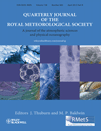
QUARTERLY JOURNAL OF THE ROYAL METEOROLOGICAL SOCIETY
Exploring the frontiers of weather and climate science.The Quarterly Journal of the Royal Meteorological Society, published by Wiley, stands as a prestigious platform in the field of Atmospheric Science, with a commendable impact reflected in its Q1 quartile ranking and a notable Scopus rank of 4th out of 148, placing it in the 97th percentile among its peers. With origins tracing back to 1873, this journal has established itself as a cornerstone for disseminating high-quality research, engaging articles, and innovative methodologies that advance our understanding of meteorological phenomena. Although it is not an open-access journal, the rigorous peer-review process ensures that only the most significant contributions are published, making it essential reading for researchers, professionals, and students dedicated to atmospheric and planetary sciences. For those interested in cutting-edge findings and comprehensive reviews, the Quarterly Journal of the Royal Meteorological Society is an invaluable resource in enhancing scientific knowledge and collaboration in this dynamic and evolving field.

Asia-Pacific Journal of Atmospheric Sciences
Fostering Innovation in Climate ResearchWelcome to the Asia-Pacific Journal of Atmospheric Sciences, a leading publication in the field of atmospheric science, published by the Korean Meteorological Society. With an ISSN of 1976-7633 and an E-ISSN of 1976-7951, this journal has been a cornerstone for researchers and practitioners in the atmospheric sciences since its inception in 2008. Recognized for its rigorous peer-reviewed articles, it holds a commendable Q2 quartile ranking in 2023 and is placed at the 51st rank out of 148 in the Earth and Planetary Sciences, reflecting its impact within the community with a 65th percentile. The journal features a broad scope encompassing meteorology, climatology, and environmental sciences, making it an essential resource for scholars and industry experts alike. As an open access journal, it ensures that groundbreaking research is widely accessible, fostering collaboration and innovation across the Asia-Pacific region and beyond. Explore the latest findings and advancements in atmospheric sciences and contribute to the dynamic field of climate research through the journal's engaging content.